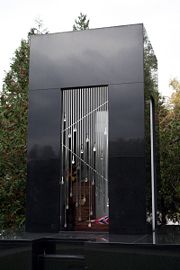
Bruno Bušic
Encyclopedia

Croatia
Croatia , officially the Republic of Croatia , is a unitary democratic parliamentary republic in Europe at the crossroads of the Mitteleuropa, the Balkans, and the Mediterranean. Its capital and largest city is Zagreb. The country is divided into 20 counties and the city of Zagreb. Croatia covers ...
n writer and critic of Yugoslav communism
Socialist Federal Republic of Yugoslavia
The Socialist Federal Republic of Yugoslavia was the Yugoslav state that existed from the abolition of the Yugoslav monarchy until it was dissolved in 1992 amid the Yugoslav Wars. It was a socialist state and a federation made up of six socialist republics: Bosnia and Herzegovina, Croatia,...
. He was one of the best-known victims of UDBA
UDBA
The Department of State Security was the secret police organization of the Socialist Federal Republic of Yugoslavia.Although it operated with more restraint than other secret...
(Yugoslav secret police
Secret police
Secret police are a police agency which operates in secrecy and beyond the law to protect the political power of an individual dictator or an authoritarian political regime....
) killing.
Bušić was born in the village of Vinjani Donji near Imotski
Imotski
Imotski , is a small town situated on the northern side of Biokovo massif, Dalmatian hinterland, Croatia. The town was first mentioned as Imotski for the first time in the 10th century and it was held by the Turks from the fall of Bosnia until 1717 when it was captured by the Venetians. The town...
. By the time he enrolled onto high school in Imotski, he was already involved in activities which communist authorities considered rebellious. In 1957 he joined a group called Tiho (calm, lit. - quietly) whose aim was to "fight for freedom, equality and the formation of a free Croatia based on democratic principles". It was at that time that the UDBA
UDBA
The Department of State Security was the secret police organization of the Socialist Federal Republic of Yugoslavia.Although it operated with more restraint than other secret...
(Yugoslav secret police
Secret police
Secret police are a police agency which operates in secrecy and beyond the law to protect the political power of an individual dictator or an authoritarian political regime....
) began watching him. Bušić, along with his schoolmates who had also participated in Tiho, were expelled from school soon after.
Two years later, the expelled students were allowed to return to school. Bušić went on to enroll in University of Zagreb
University of Zagreb
The University of Zagreb is the biggest Croatian university and the oldest continuously operating university in the area covering Central Europe south of Vienna and all of Southeastern Europe...
and earned an economics degree in 1964. In 1965 he got a job at the "Institute for the History of Croatia's Workers' Movement" (Institut za povijest radničkoga pokreta Hrvatske) which was run by former Yugoslav general and future Croatian president Franjo Tuđman. In 1966 he was sentenced to jail for his political views, but by this time he had escaped to Austria. At the behest of Tuđman who still had great influence in Yugoslavia, Bušić returned to Zagreb and was not sent to jail. In 1967 he resumed work at the Institute.
In 1969 Bušić moved on to write for the "Croatian Literary Paper" (Hrvatski književni list). Here he confronted several issues considered controversial by Yugoslav officials. The paper was eventually banned. This led Bušić to emigrate to Paris for a period of time where he attended the Sorbonne
University of Paris
The University of Paris was a university located in Paris, France and one of the earliest to be established in Europe. It was founded in the mid 12th century, and officially recognized as a university probably between 1160 and 1250...
. Upon his return in 1971, he became one of directors of the "Croatian Weekly" (Hrvatski tjednik). That same year the Yugoslav government issued a crack-down on what had been called Hrvatsko proljeće (Croatian Spring
Croatian Spring
The Croatian Spring was a political movement from the early 1970s that called for greater rights for Croatia which was then part of Yugoslavia as well as democratic and economic reforms.-History:...
). Bušić was among those arrested and he was in jail until 1973.
He left Yugoslavia for the last time in 1975. He spent most of his time living in England, but travelled extensively through the rest of Europe. He wrote for "New Croatia" (Nova Hrvatska) during this period.
He was killed in Paris, France in 1978 by an agent of UDBA
UDBA
The Department of State Security was the secret police organization of the Socialist Federal Republic of Yugoslavia.Although it operated with more restraint than other secret...
, the Yugoslav secret police
Secret police
Secret police are a police agency which operates in secrecy and beyond the law to protect the political power of an individual dictator or an authoritarian political regime....
.
Exactly 21 years after his death, with Croatian independence gained, his remains were moved from Paris to the Mirogoj cemetery
Mirogoj Cemetery
The Mirogoj Cemetery is considered to be one of the most beautiful cemetery parks in Europe and, because of its design, numbers among the more noteworthy landmarks in the City of Zagreb....
in Zagreb and were laid to rest next to the dead of the Croatian War of Independence
Croatian War of Independence
The Croatian War of Independence was fought from 1991 to 1995 between forces loyal to the government of Croatia—which had declared independence from the Socialist Federal Republic of Yugoslavia —and the Serb-controlled Yugoslav People's Army and local Serb forces, with the JNA ending its combat...
.
Vinko Sindičić, former agent of UDBA
UDBA
The Department of State Security was the secret police organization of the Socialist Federal Republic of Yugoslavia.Although it operated with more restraint than other secret...
was trialed for the murder of Bušić.He was found innocent on 2000. On June 6 2005 Supreme court of Croatia has verified that verdict.

